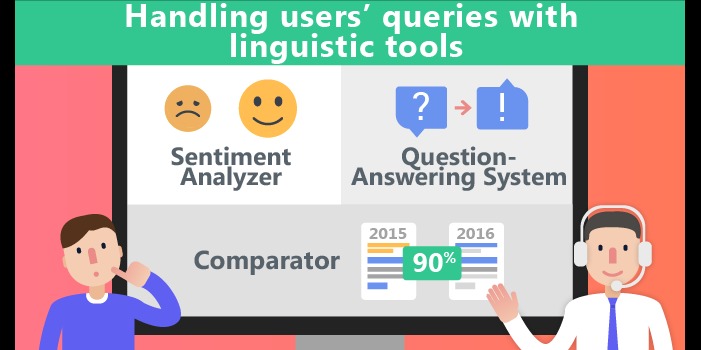

Manage customer queries more effectively with linguistic tools
Thursday November 10, 2016 , 4 min Read
For today, help and support centers become indispensable departments of any company that offers products or services. Working 24/7, support specialists face a great number of queries and a considerable amount of info and try to handle every single customer problem, as they bear in mind the following facts:
1) It takes 12 positive experiences to make up for one unsettled negative experience.
2) 42% of service agents are unable to efficiently solve customer problems.
3) It is 6-7 times more expensive to entice a new client than to maintain the present one.
This data shows that reviews and other comments management is really important, and any customer’s query should be handled in the right way and as fast as possible.
But how to address all these issues and improve customer services?
First of all, to effectively manage queries/complaints/questions, it’s important to conduct comprehensive and detailed info analysis. To succeed, help center specialists can implement customer support software that guarantees:
- Sentiment analysis of customer feedback;
- Fast and easy management of trouble tickets;
- Customer requests classification.

undefined
All these features become available thanks to a number of semantic tools:
1) Sentiment Analyzer allows to easily retrieve both positive and negative emotions/reviews of your clients, thus, managing them and preparing vital and reliable statistics on whether your customers are satisfied with the quality of products/services or not. Such weekly/monthly/quarterly reports help to assess the level of clients' discontent and to timely manage troublesome issues.
Sentiment Analyzer can be also successfully used to rate predictions (for instance, when the user rates services/products from 1 to 5). The tool is useful for vendor companies and users, as its usage allows to:
- Better understand customers’ opinions;
- Improve the default (5-star) rating system and create a new rating scale to obtain more precise users feedback;
- Help web users determine their reviews rating;
- Detect suspicious or fake online reviews.
2) Question-Answering System is the thing big-size companies can’t do without, as their help center specialists have to handle a wide range of similar customer queries. The essence of this solution consists in analyzing users’ enquiries and giving appropriate answers in natural language.
Such a system can be also used by consumers who search for certain product features or prices, by insider employees who may want to get fast answers on company policy, by researchers who deal with collecting accurate info, or by engineers who create knowledge databases.
3) Comparator is an ideal tool when it comes to tracking changes in customer reviews within a certain period of time. Comparator facilitates support specialists’ work and guarantees an automatic analysis and comparison of reviews and other feedback.
Beyond that, such an instrument is able to compare/analyze a huge array of different reports, which will also allow to obtain relevant statistics and track certain changes while processing opinions and queries.
4) Question Comparison is a tool used for question understanding and processing. It recognizes equivalent question paraphrases (at the syntactic-semantic level) and can be integrated into a system with a rich FAQs database, helping to considerably reduce user efforts required to get the right answer.
5) Categorizer represents a linguistic tool aimed at analyzing any info within the company and forming categories for further data search. Using Categorizer you’ll get a chance to classify the content by creating such categories as Human Resources, Research and Development, Finance, Customer Feedback, etc.
Thus, with the Customer Feedback category your help desk specialists will be easily managing the needed info: reviews, queries, and some other data related to this category, for example, users’ personal info thanks to which it’s possible to prepare statistics on queries in terms of countries, regions, and more.
Conclusion:
The above-mentioned examples and practices show that the opportunities of linguistic tools usage are numerous, as these instruments are not mere means of analyzing plain texts and can be used to search, compare, and structure info in various spheres, including Sales and Customers Support.
About the author:
Yana Yelina is a Tech Journalist at EffectiveSoft. You can reach her at: [email protected]




